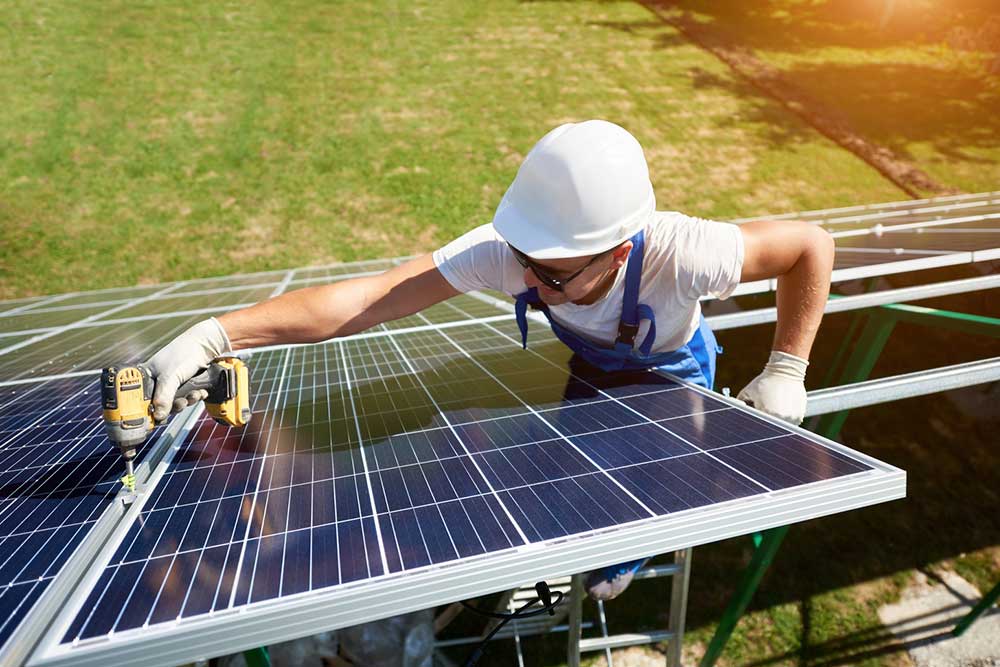Solar Panel Installation – Costs, Eligibility, and Grants
Over the last few years, the country has noted a significant shift to using sustainable energy sources, the most popular being solar energy. Solar panels (or photovoltaics), made from semiconducting materials, are used to harvest the sun’s energy and convert it into electricity to power homes, factories, offices and more. Although solar panel installation may seem like an expensive investment , it can help people reduce their electricity bills and carbon footprint.

Solar panel installation – Is it for everyone?
While the financial and environmental benefits of solar panels remain unmatched, this energy solution may not be ideal for everyone .
Roof direction and slope
Typically, solar panel companies recommend installing them on an unshaded, south-facing roof for peak performance. A 20-50° pitch is considered ideal. East-and west-facing roofs get around 15-20% less energy but are still considered efficient. Note that solar panels are not recommended for homes with north-facing roofs.
Size of the roof
This aspect depends largely on the size of the solar panel system one is looking to install. For powering homes, 3.5 kWp (kilowatt peak) is one of the most commonly used systems. This features about 6-12 panels, which take up 10 to 20 m2 of the roof surface area. To get a more precise estimate , it is best to speak to a professional installer.
Obstruction
Obstructive features such as trees, buildings, or chimneys near the solar panels could impact their efficiency. For best results, it is recommended to look for a clear, unshaded spot. Homeowners can also opt for optimisers to reduce the impact of the shading.
Planning permissions
Solar panels fall under the category of “Permitted Development” across the country, which means that homeowners do not need to apply for special approvals or planning permissions. That said, those living in listed buildings, world heritage sites, or conservation/natural park areas will need to check in with their local planning guidance well in advance.
The panel system will also have to be registered with the Distribution Network Operator (DNO) or the NIE networks, depending on one’s area of residence.
Cost of solar panel installation
The overall cost of the solar panel system in England depends on factors such as the size of the system, ease of access to the roof, choice of panels/tiles, panel integration and additional parts, among other factors. On average, homeowners can expect domestic solar panel systems (3.5 kWp) to cost around £7,000.
These installation costs also include the cost of labour. This may be calculated in two different ways – per person or charge per watt. Most professionals choose to use the latter cost calculation method at a standard rate of 20 pence per watt. Please note that this price is subject to change depending on one’s location and other factors. Based on this estimate, the labour cost for the solar panel installation ranges between £600 and £1200. It is advisable to consult with the installation company regarding these charges before signing off on the project.
That being said, these systems typically break even and start paying for themselves within 14 years. Every month, homeowners can see savings of £400-915 on energy costs per year, as the electricity generated from these panels is free to use .
UK solar grants
While it may not be possible to find solar panel installations for free, homeowners can make use of government grants that make this setup more affordable.
- 0% VAT
Buyers all across the UK are eligible to pay 0% VAT on their solar panel systems. On a 4kWp system, this results in savings of £2,850. - Energy Company Obligation 4 (ECO4)
Up until 2026, low-income households in the country may be eligible for getting partially or fully free solar panels. - Smart Export Guarantee (SEG)
All solar panel owners can save an additional £45-80 under this program. - Home Upgrade Grant (HUG)
Homes with an energy performance rating of D to G are eligible for this program, where they can potentially save up to £10,000 on solar panel costs, depending on their location or type of property. - Public Sector Decarbonisation Scheme (DSBS)
This regional scheme is available for companies and institutions looking to decarbonise until April 2025. The total savings may vary depending on one’s location.
Getting a solar panel installation
Getting solar panels installed in one’s home is quite simple. To begin with, individuals must use a solar panel calculator to get an estimate of the right system size for their homes. These calculators can be found online for free.
The next step is to get quotes from vendors. Experts advise speaking to at least three MCS-qualified installers regarding the cost of the battery, inverter and system setup. A simple browser search can help individuals find solar panel installers nearby. Based on one’s budget and needs, individuals must now select their installer and pick an installation date.
On the scheduled date, the installer will arrive with all the necessary equipment for the job . They will start by installing the scaffolding before adding the mounts, panels and battery. The inverter is then connected to the home. Upon completion, the installer will conduct a test of the panels to identify any faults and will then provide a detailed explanation of the solar panel system to the homeowner. The installation process is now finalised and the solar panel system is fully operational and ready to use!